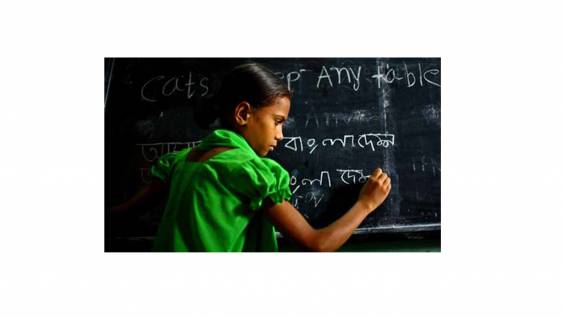35% yet to reach literacy levels
The government is going to fail to accomplish its target of eradicating illiteracy by 2014 as the latest counts show that around 55 million people – 35% of the population – are still illiterate.
Primary and Mass Education Minister Mostafizur Rahman Fizar at a press briefing yesterday said at present Bangladesh’s literacy rate was 65-67%.
On September 5 last year, previous primary and mass education minister Afsarul Ameen said 71% of the population was literate.
Currently, the country’s population is 15.69 crore.
Fizar and Bureau of Non-Formal Education’s Director General Zahir Uddin Ahmed admitted that the government would not be able to meet the 2014 target.
In its 2008 election manifesto, the Awami League pledged to achieve 100% literacy by this year. The National Education Policy 2010 and the government’s Sixth Five-Year Plan also aim at achieving the target.
Bangladesh observes the International Literacy Day today with the theme “Literacy and Sustainable Development.”
According to Unesco, literacy is the ability to understand what one reads and writes in their first language and the ability to keep day-to-day accounts related to household income and expenditure.
All successive governments since 1991 have always considered education as a prioritised sector and allocated large budgets, but none have been able to achieve their target of eradicating illiteracy.
Officials at the Primary and Mass Education Ministry have blamed poor planning in implementing projects towards the target along with a lack of budgetary allocation as the key reasons behind the failure.
These governments had so far taken up several projects and already spent Tk2,500 crore, of which Tk1,000 crore funded by the state exchequer and the rest from foreign aids, between 1991 and 2014, an official said.
A number of ministry officials said foreign donors were no more interested in providing aid because of the widespread allegations of corruption and irregularities in projects under the Primary and Mass Education Ministry.
Meanwhile, with the government mainly focusing on the primary education, the non-formal education system had remained largely ignored, resulting in the failure in project implementation and meeting targets, the officials added.
Responding to queries at yesterday’s press briefing, the primary education minister said: “We targeted to achieve cent percent literacy by 2014, but we have not been able to meet the target. A lot of work towards fulfilling the target is still pending.”
Asked how the government is planning to meet the target, Fizar said: “The ministry is taking up multipurpose plans where basic literacy project is the core element to improve the literacy rate.”
In February this year, Ecnec approved the Basic Literacy Project worth Tk452 crore to be implemented in 64 districts to provide basic literacy and life skills education to 4.5 million people aged between 15 and 45.
The project was scheduled to begin in that month and end in June 2018, but sources at the ministry said much of the preparation was still to be made and the project could not begin before June 2015.
Interestingly, Secretary Quazi Akhtar Hossain of the ministry, presented a different statistics at the briefing, claiming that 70% of the population was literate at present.
“The literacy rate would be much higher than the figures cited by different organisations. We have information that 2.5 crore people in the country are illiterate,” he said.
According to the fifth Population and Household Census 2011, a total of 51.8% people aged seven years and above were literate.
According to the Literacy Survey 2011 published in July 2013, the Bangladesh Bureau of Statistics estimated the functional literacy rate at 53.7% for people aged 11-45 years.
The Human Development Index 2014 rankings of the UNDP says 57.7% of the population aged 15 years and above in Bangladesh are literate.
Campaigners and observers have said adult literacy and non-formal education programmes did not move fast because of a lack of proper plans and project methodologies.
KM Enamul Haque, deputy director of the Campaign for Popular Education (CAMPE), said the illiteracy rate was not coming down significantly as the government had not taken up any sustainable non-formal programmes since 2002.
“If there had been any such programmes after 2002, the illiteracy rate would have been much lower than now. As the government did not change the methodologies or take any sustainable programmes, donor funding became irregular, which has ultimately slowed down these programmes,” he said.
He suggested that the government should strengthen its Bureau of Non-Formal Education and conduct follow-ups on the basis of Total Literacy Movement to expedite the process of achieving the target.
Zahir Uddin Ahmed, director general of the Bureau of Non-Formal Education, told the Dhaka Tribune: “Despite different attempts, the government has failed to meet the target because of ancillary activities related to the project that includes funding.”
Along with the basic literacy programme, the government has to initiate more programmes involving awareness creation to bring entire population under the light of literacy, he added.










